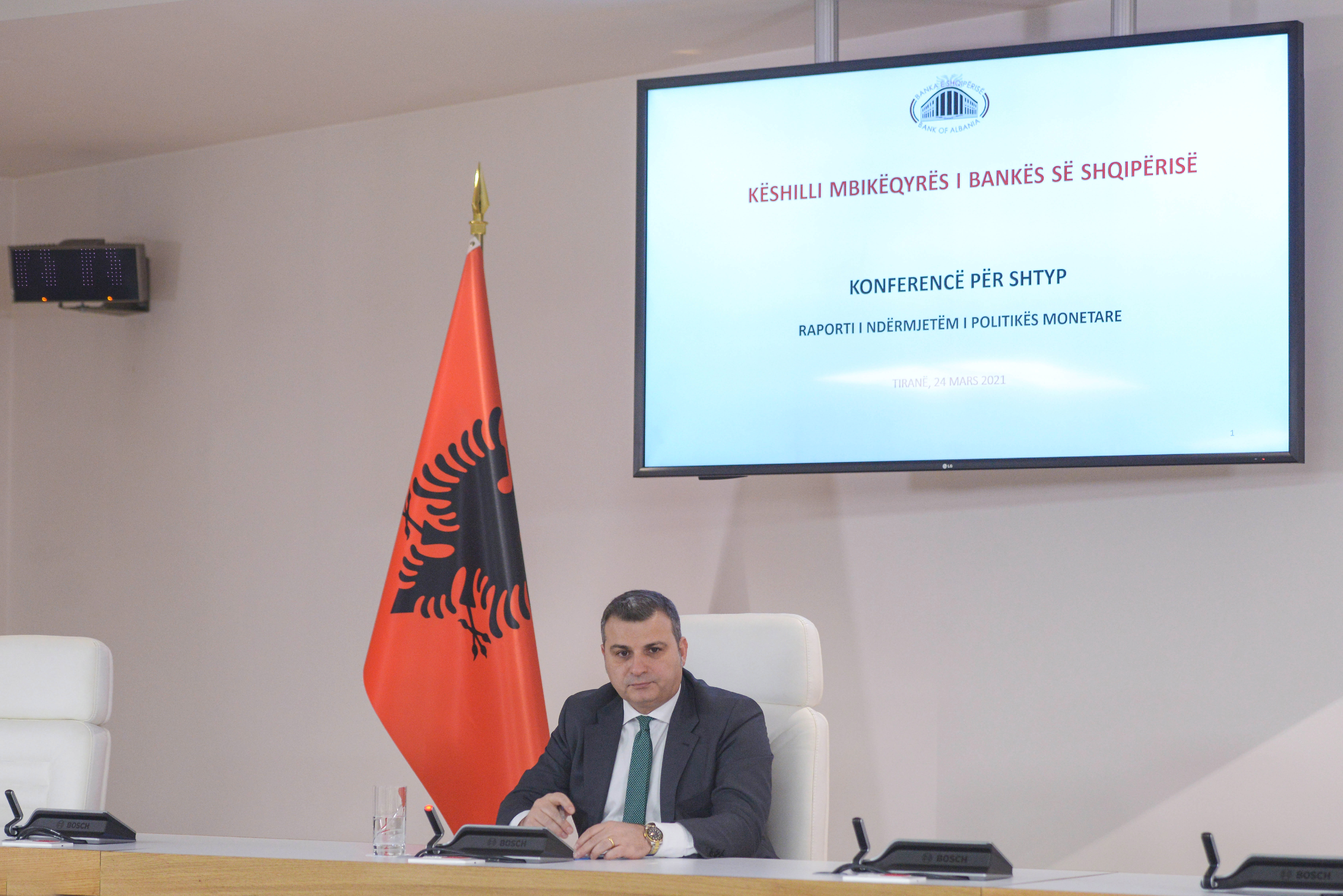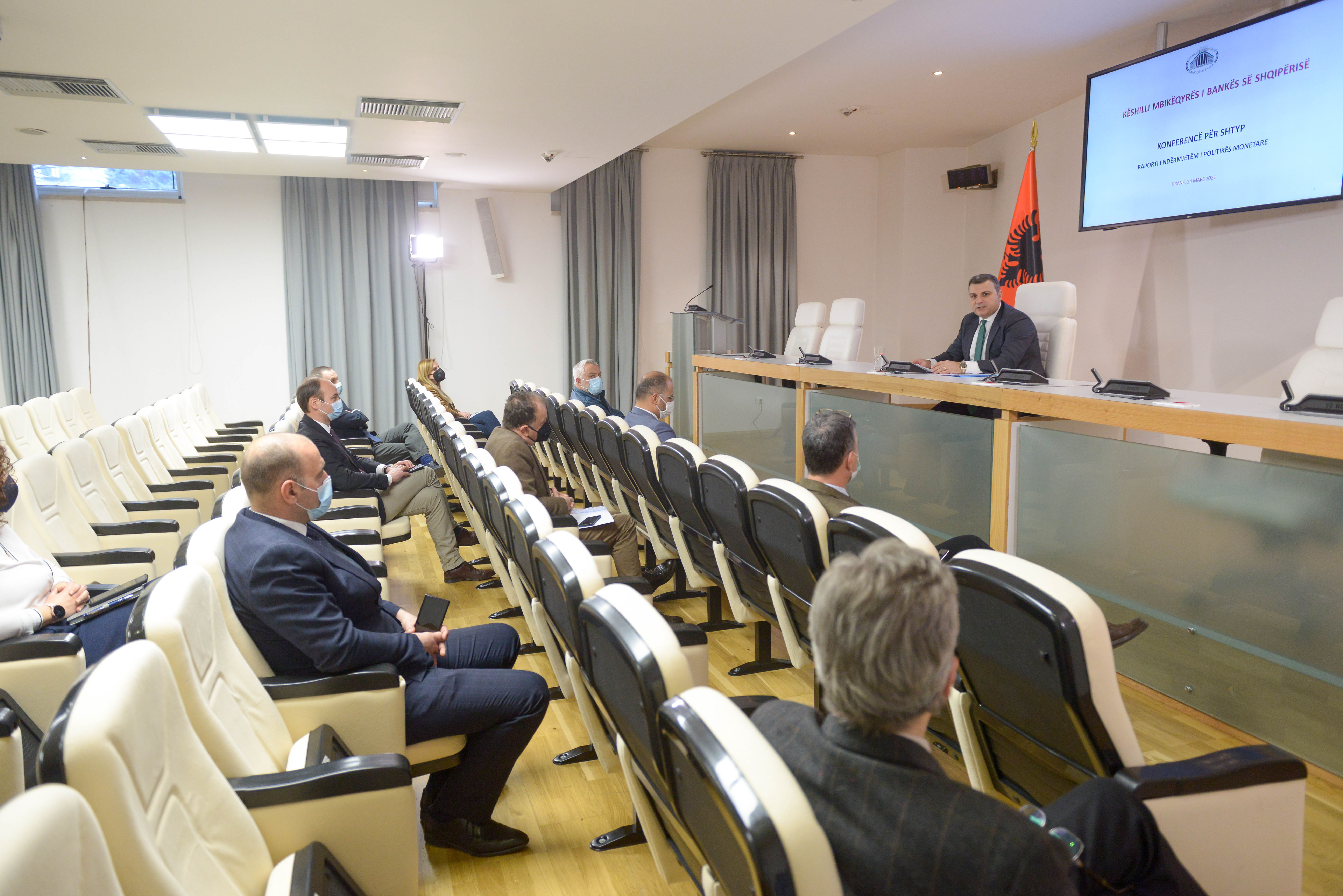BANK OF ALBANIA
PRESS RELEASE
Governor Sejko: Statement to the Press Conference on Monetary Policy Decision, 24 March 2021
Publication date: 24.03.2021
Dear Ladies and Gentlemen,
Today, on 24 March 2021, the Supervisory Council of the Bank of Albania reviewed and approved the Intermediate Monetary Policy Report.

In balance, the new analysed information shows that economic activity has been gradually improving during the last months. The fall of inflation in the first two months of this year, appears to reflect the temporary effect of supply-side fluctuations. Though, the Supervisory Council notes that inflation continues to undershooting the target, while economic activity and employment continue to remain below pre-pandemic levels.
Our updated projections suggest that economic activity will gradually normalise during the next two years. This normalisation, in turn, will enable an increase in employment, wages and profit margins of enterprises, hence creating premises for inflation to converge to its 3% target within 2022.

Against this backdrop, the Supervisory Council assesses that the current simulating monetary policy stance remains adequate. The Bank of Albania will aim at maintaining the favourable financing conditions throughout the medium-term horizon, to guarantying the recovery of economy and the return of inflation to target.
[ Following, I will introduce in more details the reasons backing the decision-taking and the conclusions on the discussions of the Supervisory Council. ]
***
Inflation recorded lower values than our expectations during the first two months of year. Annual inflation rate dropped to 0.4% in January, while it increased at 1.1% in February. This performance was driven by the volatilities in prices of food items, which, like in the previous year, remain object to unexpected supply-side volatilities, in the context of pandemic.
On the other side, factors with medium-term impact on inflation - aggregate demand, employment and wages performance - have been in line with our expectations. Domestic pressures on wages - though still insufficient for the return of inflation to target- and prices appear stable and continue to significantly contribute in the formation of inflation, as shown by the performance of core inflation. Hence, the effect of supply-side shocks is expected to be transitional and to not jeopardise the return of inflation to target within 2022.
The new information on the economic activity, overall, is in line with our expectations. Direct data on the performance of both gross domestic product and aggregate demand are still not available, but indirect data suggest for a continuation of the recovery during the last two quarters. The growth in the volume of sales, the increase in electrical energy consumption, better performance of fiscal revenue, and the expansion in both exports and imports signal for a better performance of economy.
On the other hand, labour market showed a fall in employment in 2020 Q4, and an increase in unemployment rate at 11.8%. The fading out of positive impact of summer season in service branches and the tightening of measures to contain pandemic have negatively affected the employment dynamics at the end of the previous year.
Both the accommodative monetary policy and fiscal stimulus have underpinned the economic activity in Albania.
Fiscal policy has continued to maintain simulating features, mainly due to the increase of capital expenditure. Budget revenues have recorded a slight decrease, while public expenses increased. In line with the adopted budget, fiscal policy will remain simulating throughout 2021 as well, by fuelling the growth of aggregate demand and the expansion of economic activity.
The simulating monetary policy has provided for the establishment of the favourable financing conditions. Financial markets operate smoothly and are characterised by ample liquidity and contained risk premia. Their good situation has enabled the pass through of fiscal stimulus, which in turn has maintained the interest rates on loans to private sector at low levels. Also, the exchange rate appears stable, by reflecting the supply and demand balance for foreign currency.
The simulating monetary conditions have supported the growth of bank credit, which has continued to be a stable financing source to Albanian households and enterprises. The volume of bank credit to private sector recorded an annual growth of 7.1% in February. The expansion of credit was relatively balanced, regarding: the structure of currencies; enterprises or households; and the financing of investments or working capital. In addition, the progressive expansion of the share of loans in lek to total loans, shows encouraging signals regarding the strengthening of monetary policy effectiveness. This indicator marked 50% at the beginning of 2021.
The upward performance of lending is providing a considerable impact in bolstering aggregate demand and economic recovery. It reflects the effect of simulating monetary, financial and fiscal measures, for boosting lending, the good financial situation of banking sector, and the pro-active position adopted by banks given the situation we are going through.
Looking ahead, the Supervisory Council expects the economic activity to return to the positive growth rates in 2021 and in the next period. Economic growth is expected to be supported by a considerable monetary and fiscal stimulus, the reduction of uncertainty and the recovery of global economic activity. These factor are expected to boost the increase of: consumption; exports; and investments; as well as gradually increase incomes in all sectors of economy. The growth of the demand will support the increase of employment, in turn, further rise in wages, and a gradual convergence of inflation to target within 2022.
In any event, these projections are based on the assumption for a progressive reduction of pandemic during 2021, and are considerably conditioned from the latter. How pandemic will evolve and its impact on economy continue to remain an uncertainty source in economic forecasts.
The Supervisory Council deems that the balance of risks continues to remain on the down side. In particular, downside risks arise from:
- a prolongation of pandemic and restrictive measures it arises on the economic activity;
- a slower rebound of both consumption and investments, due to a more prudential behaviour of Albanian households and enterprises;
- a slower monetary stimulus pass-through, due to a more prudential behaviour of banks in lending.
***
In consistence with these projections, the Supervisory Council assesses that the current monetary policy stance remains adequate.
In this view, the Supervisory Council decided to:
- Keep the policy rate unchanged, at 0.5%;
- Keep the overnight deposit and overnight lending rates, unchanged at 0.1% and 0.9%, respectively.
In addition, the Supervisory Council judges that monetary policy stance will continue to remain accommodative throughout the medium-term horizon, for the stable rebound of economic activity and for the return of inflation to target.
Last, the Supervisory Council highlights that the materialization of the down-side risks would require further easing of monetary policy stance.

 Linkedin
Linkedin
 Twitter
Twitter
 Facebook
Facebook
 Instagram
Instagram
 Flickr
Flickr
 RSS
RSS
 Subscribe
Subscribe
 Feedback
Feedback